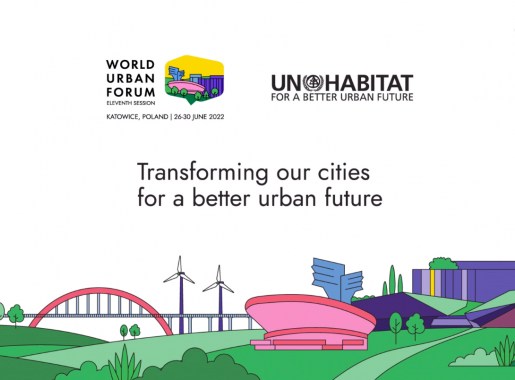11th World Urban Forum: Nature-based solutions for sustainable urban development
Discussions by representatives from across the globe focused on whether upscalability of nature-based solutions is feasible.
Between 26-30 June 2022, the 11th session of the World Urban Forum (WUF11) was held in Katowice, Poland and simultaneously streamed for an online audience. WUF is the premiere global conference on sustainable urbanisation and the four-day event consisted of roundtables, dialogues, panel discussions, assemblies, and special sessions on topics ranging from national urban policies and affordable housing to greening efforts in urban spaces and possibilities for sustainable practices. WUF11 was co-organised by UN-Habitat, Poland’s Ministry of Development Funds and Regional Policy and the Municipal Office of Katowice.
The theme of WUF11, “Transforming our Cities for a Better Urban Future”, aimed to improve understanding and bring clarity on the future of cities based on existing trends, challenges and opportunities. It also suggested ways through which cities can be better prepared to address future pandemics and a wide range of other unexpected events.
The panel discussion, titled “Nature-based solutions for sustainable urban development”, was of direct interest to the NICHES project considering nature-based solutions (NbS) are a core theme of its concept and objectives. The session focused on outlining the potential of NbS in adaptation and mitigation with benefits for urban residents, nature, and the economy.
The panellists from various countries across the globe – Poland, Italy, Jordan, People’s Republic of China, Hong Kong (SAR) etc. – discussed the rise in importance and commitment to green initiatives in urban areas. The representatives discussed the efforts their institutions and projects have undertaken in the realm of NbS implementation and what hurdles they have had to overcome (e.g. the preference to have more parking space instead of more green areas in cities).
Interesting cases from Jordan and China were discussed, where there is currently a problem with flash floods and an urgent need to build resilience towards climate change induced events. The cases had constructed innovative models that are aiming to mitigate extreme weather events. In China, researchers and practitioners are building a stormwater storage through road pavements system that regulates sewage overflow. In Jordan, the Al Zohour Green Triangle construction has the capacity to store water underground, which can then be transported back above the ground and be re-used. This is especially valuable for the drought-prone areas in Jordan so as to regulate water supply on demand.
In the closing comments of the session, the upscalability of the described models was raised as a question by the audience. Indeed, the developments in NbS implementation are still small-scale, but the large all-encompassing transformation has to start at the neighbourhood level and be assessed for the benefits it brings to urban cityscapes. In this way, time is saved and resources are channelled to promising initiatives that have the potential to transform cities, thus ensuring successful upscaling.
